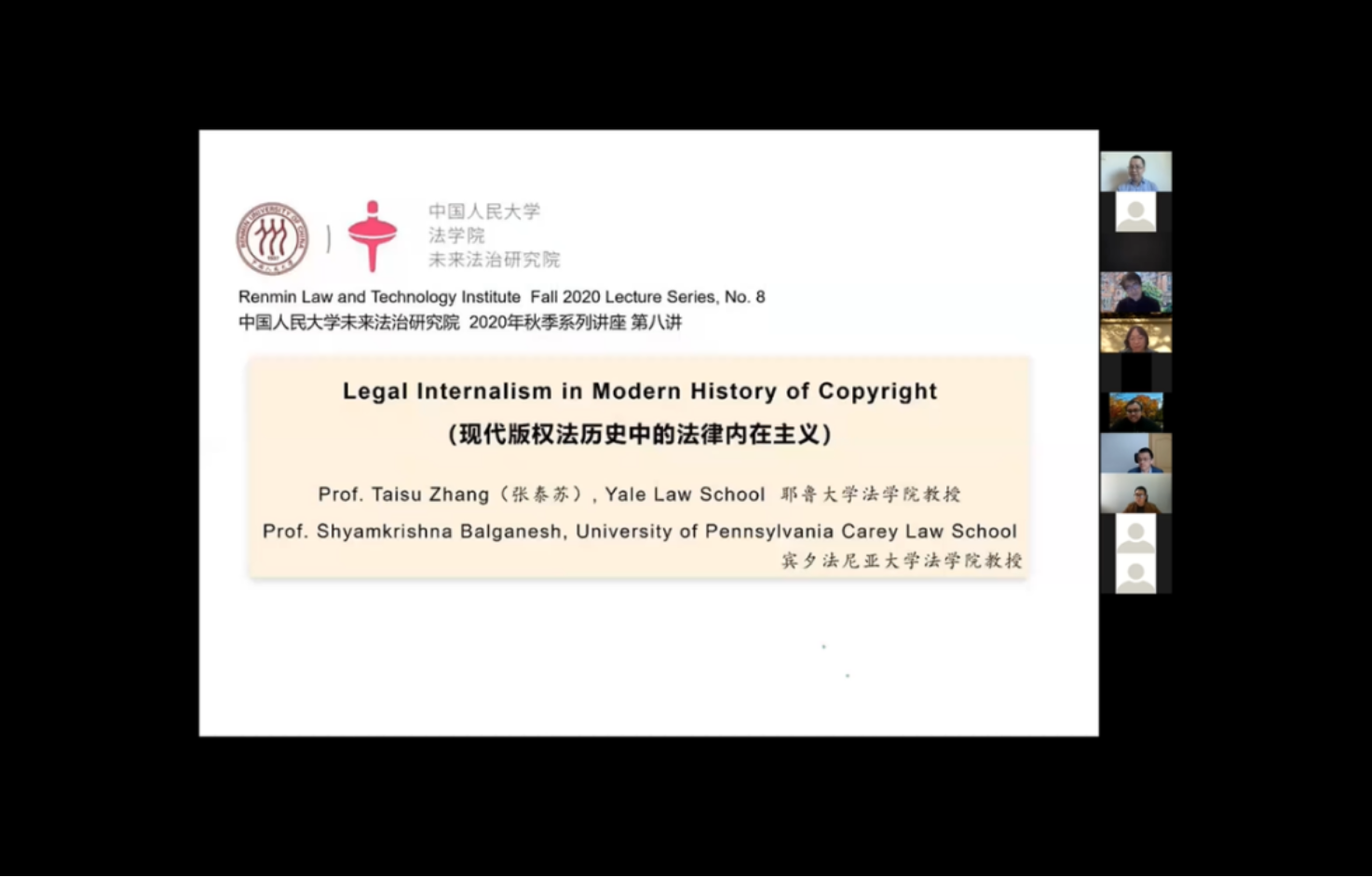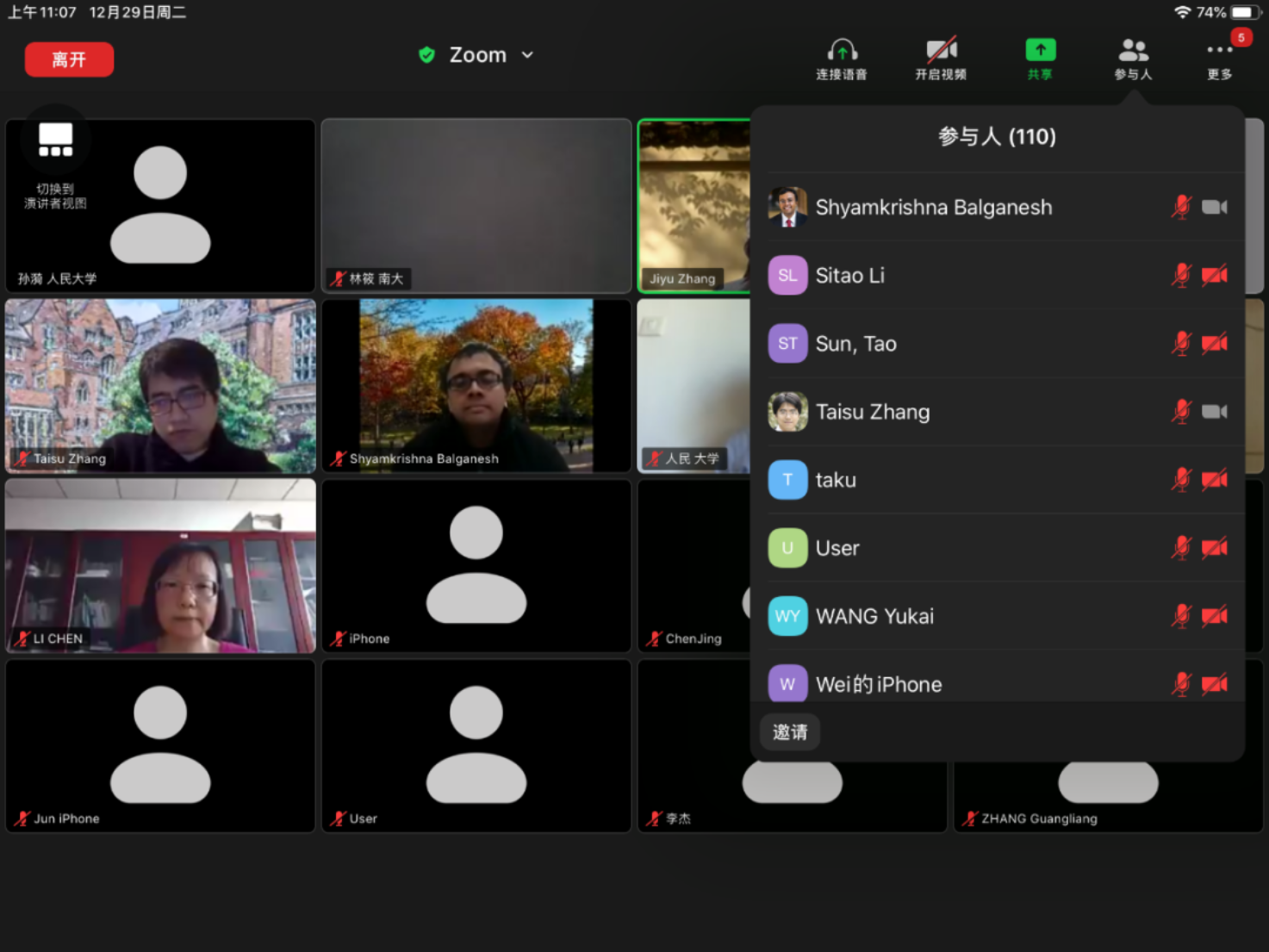Professor Zhang Taisu and Professor Shyam Balganesh Gave a Lecture on Legal Internalism in Modern History of Copyright
time:2021-02-06On the morning of December 29, 2020, invited by Law and Technology Institute of Renmin University of China, Intellectual Property Law Teaching and Research Section of Renmin University of China, International Intellectual Property Research Center of Renmin University of China, Legal Science Teaching and Research Section of Renmin University of China, Professor Zhang Taisu, Yale University Law School, and Professor Shyam Balganesh, University of Pennsylvania, USA, carried out academic exchanges with our school’s teachers and students. A wonderful lecture entitled "Legal Internalism in Modern History of Copyright" was held online, which attracted the participation of many teachers and students of our school.

This lecture was the eighth in a series of lectures organized by Law and Technology Institute of Renmin University to celebrate the 70th anniversary of the Law School of Renmin University. Professor Li Chen, Renmin University of China Law School,Professor Zhang Guangliang, Renmin University of China Law School, Associate Professor Zhang Jiyu, Executive Dean of Law and Technology Institute of Renmin University of China, Associate Professor Ding Xiaodong, Deputy Dean of Law and Technology Institute, Renmin University of China, Assistant Professor Wei Lizhou, Guanghua Law School of Zhejiang University, Assistant Professor Wang Yukai, Shanghai International Intellectual Property School of Tongji University, Assistant Professor Hu Cheng, Zhejiang Gongshang University Law School, attended the webinar.
This lecture revolved around the article "Legal Internalism in Modern History of Copyright" co-authored by Professor Zhang Taisu and Professor Shyamkrishna Balganesh.
At the beginning of the speech, Professor Zhang Taisu introduced the division of labor: Professor Shyamkrishna Balganesh gave a keynote speech on the perspective of copyright, then Professor Zhang Taisu introduced the guiding idea of this paper: the perspective of legal internalism, and finally returned to the discussion of copyright law and legal internalism, which was summarized and reviewed by the two professors.
Professor Shyamkrishna Balganesh pointed out that modern research on the history of copyright attempts to explain the direction of the development of copyright in a more detailed and interdisciplinary way. The problem is that this kind of writing of copyright history consciously keeps copyright history away from the influence of law, and considers copyright law as a kind of copyright structure and a secondary factor in the evolution of copyright. In his opinion, no matter which kind of discourse avoids the core element of copyright law, the causal chain of historical evolution of copyright can not be coherent.
In the second part, Professor Zhang Taisu discussed the legal internalism which is lacking in historical studies.
Professor Zhang Taisu first defined what is internal law, described its as a behavior phenomenon in the evolution of law ideology behind, secondly he expounded the internal law behavior theory, and demonstrated the internal law from the angle of behavior theory is not an accidental phenomenon of social law. Professor Zhang Taisu pointed out that the decisive influence of legal internalism does not mean that legal research should accept legal internalism without reflection. On the contrary, for legal researchers, it should be particularly clear that legal internalism is a social construction rather than a system of truth.
Finally, Professor Shyamkrishna Balganesh reviewed the theory of legal internalism in general. He believed that the key to the understanding of legal internalism is to clarify the nature of its behavior phenomenon, that is, although the behavior of legal professionals basically follows the three core characteristics of legal internalism, it is only an acknowledgement of a behavior pattern, and does not reflect the real subjective belief of the actor. Professor Shyamkrishna Balganesh also discussed the connection between the theory of legal internalism and Duncan Kennedy's famous treatises on legal consciousness.

Associate Professor Zhang Jiyu, Executive Dean of Law and Technology Institute of Renmin University of China, first of all thanked the two professors for their lectures and expressed their own views on the contents of the lectures.
Associate Professor Zhang Jiyupointed out that legal doctrines are still the dominant paradigm of legal studies in China.She proposed that when we understand and predict the development of law from the perspective of social science, perhaps we should pay more attention to the influence of legal doctrines and legal internalism phenomenon, which is the deficiency of current Chinese legal research.
Professor Li Chen of Renmin University of China Law School agreed with the two speakers on legal internalism. She made her point through a series of examples. She thought the right to development is still the mainstream trend in the development of the copyright law, because the work has been regarded as a kind of property in the legal system, on the basis of general principles of property rights, in addition to the law restrictions, dominate the property with the property owner's largest possible, thus the expansion of copyright will become due under the legal logic.
ProfessorZhang Guangliangof Renmin University of China Law School echoed the views of the two professors in his comments, pointing out that legal internalism was also an important factor in the formation and revision of China's copyright law. At the same time, Professor Zhang Guangliang asked the two professors whether the conclusions about legal internalism and the history of copyright described here could be applied to other fields of intellectual property, or even other fields of the history of property rights.
Associate Professor Ding Xiaodong, Deputy Dean of Law and Technology Institute of Renmin University of China, said he strongly agrees with the research done by the two professors that the evolution of copyright law, as well as legal evolution in other areas of law, cannot be viewed only from an external perspective. Associate Professor Ding Xiaodong raised two questions. First, what is the difference between the study of this paper and the cultural study of law? The second question is that the description of legal internalism by the two professors is more descriptive, that is, they believe that the influence of legal internalism has been ignored in the three works on copyright law. But what about legal internalism from a normative or utilitarian point of view?

Wei Lizhou, Assistant Professor of the Guanghua Law School of Zhejiang University, agreed with the core point of the speech, namely, legal internalism, as a behavioral phenomenon, should not be ignored or underestimated in the narrative of institutional history. He recommended the book Intellectual Property and the Common Law, edited by Professor Bagalnesh, and pointed out that the book focuses on how Intellectual Property derives institutional nutrition from the Common Law, which is in essence an embodiment of legal internalism. It can be seen from this that the two speakers also have certain differences in their attitudes towards legal internalism.
Assistant Professor Wang Yukaiof Tongji University, Shanghai institute of international intellectual property thanked the wonderful interpretation of the two professors, and put forward three questions on the lecture content: first, considering the law of a country's stage of development, regional differences or the legal department, inherent law theory can explain its history? Second, in the discussion of the theory of legal internalism, have the two professors noticed the differences in the process of legal development in different countries? Thirdly, from the perspective of research methods, the influencing factors of specific legal evolution are a matter of fact judgment. So, have the two professors considered using empirical methods to discuss?
Hu cheng, Assistant Professor of law school of Zhejiang Gongshang University, first commented on the content of the lecture from the perspective of methodology, and then posed questions to the two professors in combination with the debate on legal formalism and legal realism in the legal circle. Then, Assistant Professor Hu Cheng referred to the great debate between legal formalism and legal realism and its impact on legal internalism, and asked the two speakers how legal internalism combined formalism and realism.
Finally, for the sake of time, ProfessorZhang Taisu and Professor Shyamkrishna Balganesh answered some of the questions raised by the reviewers. After more than two hours of lecturing and discussion, the lecture came to a successful end in applause.

